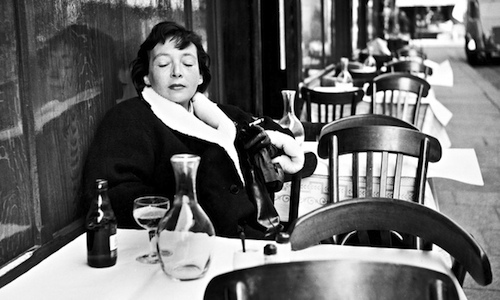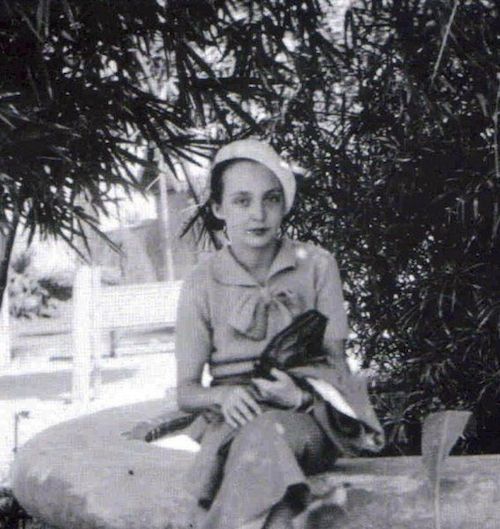Notes Toward a New Language: Holes: On Marguerite Duras
BY Cynthia Cruz
Marguerite Duras's writing is filled with holes. Her writing is made of holes, filled with holes, because her life is made up of holes. Pock-marked and moth-bitten, it is a map of the disaster.
The writing has holes in it for breath, for breathing, for grasping in the dark for the proper word to describe the precise abject poverty, the exact place in which the writer loses herself, where she becomes lost. It is in the ellipses, in the pause, in the constant caesura, the cut, the comma and stops made by punctuation and also by space on the page.
In No More, Duras’ final book, a meditation on the end of her life and her imminent death, she writes in tiny marks, like an animal clawing at the gates of death. Less than vignettes, fractured fractures, she leaves the page bare for all of the unsaid:
Holy Saturday
What I am going to turn into.
I am afraid.
Come. Come with me.
Later, the same afternoon
Let’s go see the horror, death (43).
The writing is made of holes because the writer’s world is made of holes but also because the writers’ syntax and grammar are made of holes (the result of her childhood, which stains everything, informs everything, is a run that shadows her entire life): hesitation, stutter, stammer. Duras’ writing is threadbare, it is filled with holes, like the child Duras whose girlhood was devoured, the girl-Duras who learned early of the currency of being female, of dressing like a grown woman; like a child prostitute.
Standing at the precipice, she has no words to describe the wound that is her past. And so the only proper language, the only true means of representing the ruin, the remains, is silence or a kind of silence.

In Writing, Marguerite Duras calls for a new language, a language capable of speaking to the true state of the world:
There should be a non-writing, and it will come some day. A simple language without grammar. A form of writing consisting only of words. Words without grammar to sustain them, abandonment as soon as they have been written down (47).
Here, what Duras is describing is a writing made entirely of holes with no connective tissue--the exact replication of her experience. Something shorn of decoration, a writing that turns our gaze to the world and away from the writer. A language loose and broken, like beads jeweled along a frayed string of thread. Duras’s words are symbols, they are images. They escape syntax and grammar. Each word is its own universe of meaning. Each word an image compressed with its own world of meaning, floating on the page. Her words do not attempt to explain, how can they? There are no answers to the brutality she has seen, she has, herself, experienced: a childhood of extreme poverty and her girlhood, ended abruptly, as a result.

Here, there is no narration, no story line. Each word of Duras’s represents, it is, in fact, an image, a container holding meaning rather than a word attempting to explain. What this does, Duras’s non-writing, is mirror the world as she sees it. And the world that she sees is a world of poverty and child prostitution, of excess wealth and power, filth and disease, war and concentration camps. Her experience informs her life which, of course, informs her writing: there are no borders.
And how does one write of such a world? To use the scaffolding of those in power, the power structure, is to continue the barbarity. The only language that can speak of the world as it is—broken as it is—is a broken, un-knowing language, one that takes as its point of departure, a stance of not-knowing, of un-knowing, of blindness. This un-knowing, or not-knowing, is necessary when one begins to write. “Because a book is the unknown,” Duras writes, “it’s night, it’s closed off.” To write what one does not know means going beyond one’s capabilities. It is impossible and yet—it can be done. Blinded and groping—not knowing, this is how it is done. In Writing, Duras explains:
In life there comes a moment, and I believe that its unavoidable, that one cannot escape it, when everything is out into doubt…And this doubt grows around one. This doubt is alone, it is the doubt of solitude, it is born of solitude. We can already speak the word. I believe that most people couldn’t stand what I’m saying here, that they’d run away from it. This might be the reason why not everyone is a writer, yes. That’s the difference. That is the truth. No other. Doubt equals writing. So it also equals the writing(10).
Writing is a form of blindness and is a kind of death. Knowing, or telling ourselves we know and writing from a sense of knowing, of so-called authority, keeps us afloat, helping us push back away any thought of death. But death is everywhere. Doubt and silence are openings to death which is why we are afraid of not knowing, of being seen as stupid, or “out of it.” But a person who does not recognize the suffering of others, who cannot comprehend death and poverty, is a person who is dead already.
Born into dregs, one will always recall the terrible smell of death and illness everywhere. This filth, this glitter of the terrible, is what then resides inside one’s own writing. Death, inside the writing.
Duras writes from the disaster, just as it colors her life, darkening it, so does it color her words; her writing. This, the trace of annihilation, this death, is in all of the writing, a sickening ash. It is a glint, a dark jewel of rubble that sparkles inside the construction of her language.
Cynthia Cruz is a poet, novelist, and nonfiction writer. She is the author of the poetry collections...
Read Full Biography

